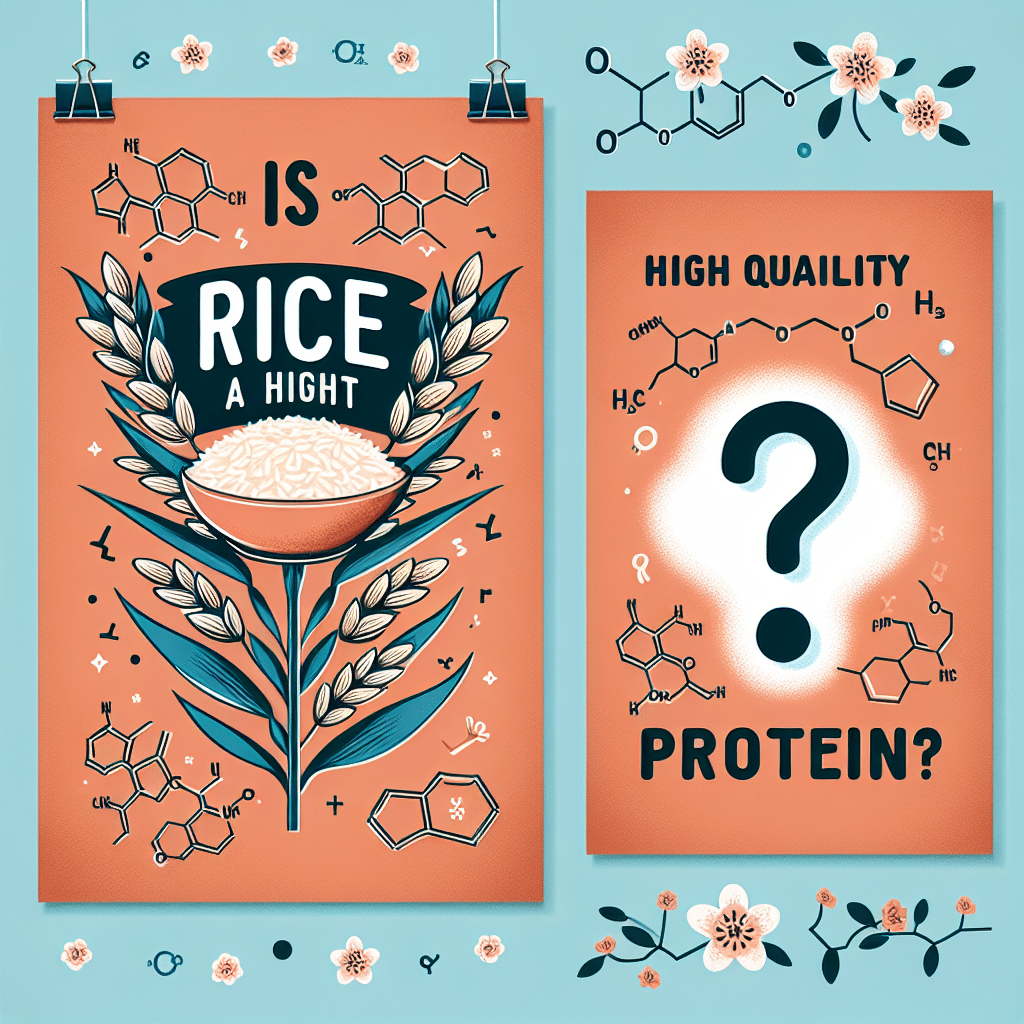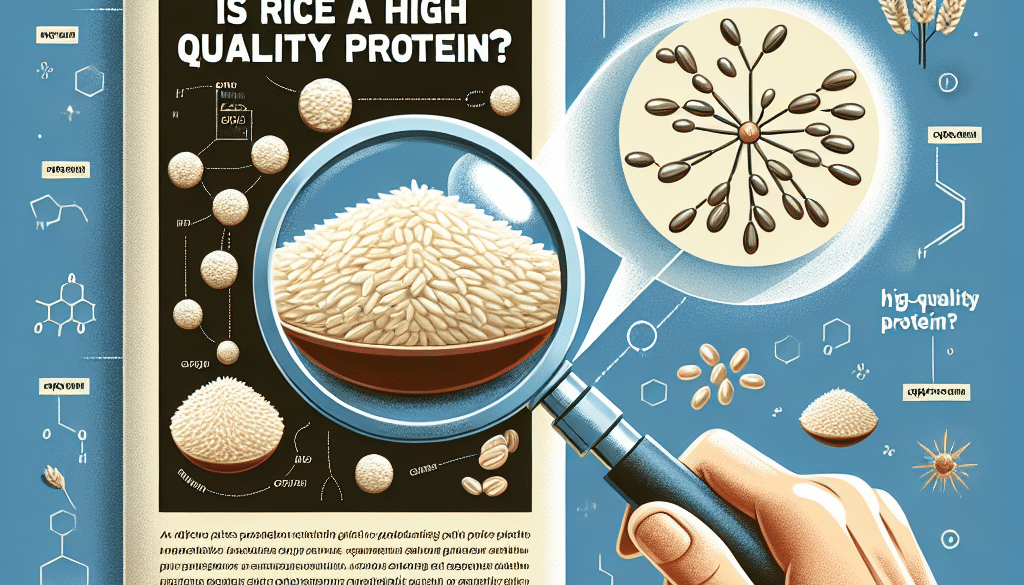Is Rice A High Quality Protein?
-
Table of Contents
- Is Rice Protein a High-Quality Source for Your Dietary Needs?
- Understanding Protein Quality
- The Amino Acid Profile of Rice Protein
- Digestibility and Bioavailability
- Health Benefits of Rice Protein
- Comparing Rice Protein to Other Protein Sources
- Case Studies and Research
- Conclusion: Is Rice Protein Worth Considering?
- Discover ETprotein’s High-Quality Rice Protein Products
Is Rice Protein a High-Quality Source for Your Dietary Needs?

When it comes to protein, the quality and source matter just as much as the quantity. With the growing interest in plant-based diets, rice protein has emerged as a popular alternative to animal-based proteins. But is rice protein a high-quality protein? This article delves into the nutritional profile of rice protein, its benefits, and how it compares to other protein sources.
Understanding Protein Quality
Protein quality is determined by two main factors: the amino acid profile and digestibility. A high-quality protein contains all nine essential amino acids in sufficient amounts and is easily digestible by the body. Animal proteins, such as meat, dairy, and eggs, typically meet these criteria and are considered complete proteins. Plant-based proteins, on the other hand, often lack one or more essential amino acids, making them incomplete proteins.
The Amino Acid Profile of Rice Protein
Rice protein is derived from brown rice and is often treated with enzymes that separate the protein from the carbohydrates. The resulting protein powder is then used in supplements and food products. While rice protein contains all nine essential amino acids, it is low in lysine, which is a limiting factor in its quality. However, when combined with other plant-based proteins that are rich in lysine, such as pea protein, it can provide a complete amino acid profile.
- Essential Amino Acids: Rice protein contains all nine but is low in lysine.
- Combining Proteins: Pairing rice protein with other plant proteins can create a complete amino acid profile.
Digestibility and Bioavailability
The digestibility of rice protein is generally high, which means the body can efficiently absorb and utilize it. However, it may not be as readily digestible as whey protein, a benchmark for protein quality. The bioavailability of rice protein can be improved through proper processing techniques, such as fermentation or sprouting.
Health Benefits of Rice Protein
Rice protein offers several health benefits, making it an attractive option for those looking to increase their protein intake with plant-based sources.
- Hypoallergenic: Rice protein is naturally hypoallergenic, making it suitable for individuals with allergies to dairy, soy, or gluten.
- Heart Health: Studies suggest that rice protein may help lower cholesterol levels, benefiting heart health.
- Weight Management: As with other proteins, rice protein can promote satiety and help in weight management efforts.
- Muscle Growth: Rice protein can support muscle growth and repair, especially when consumed after exercise.
Comparing Rice Protein to Other Protein Sources
When compared to whey, soy, and pea proteins, rice protein holds its own in terms of nutritional value and potential health benefits. However, it’s important to consider the complete amino acid profile and digestibility when choosing a protein supplement.
- Whey Protein: Whey is a complete protein with high digestibility but is not suitable for vegans or those with dairy allergies.
- Soy Protein: Soy is also a complete protein and a good plant-based option, but some people prefer to avoid it due to concerns about phytoestrogens.
- Pea Protein: Pea protein is rich in lysine, which complements rice protein’s amino acid profile when combined.
Case Studies and Research
Several studies have examined the effectiveness of rice protein in muscle building and recovery. One study published in the Nutrition Journal found that rice protein isolate could provide the same benefits as whey protein in terms of muscle recovery and growth when taken post-workout. This suggests that rice protein can be an effective alternative for athletes and fitness enthusiasts.
Conclusion: Is Rice Protein Worth Considering?
Rice protein may not be a complete protein on its own, but it is still a high-quality source of protein that offers numerous health benefits. When combined with other plant-based proteins, it can provide a complete amino acid profile. Its hypoallergenic nature and potential for supporting heart health and weight management make it a valuable addition to any diet, especially for those with specific dietary restrictions or preferences.
Discover ETprotein’s High-Quality Rice Protein Products
If you’re looking for a reliable source of high-quality rice protein, ETprotein offers a range of products that cater to various needs. Their organic rice protein is characterized by a neutral taste, non-GMO, and allergen-free attributes, making it an excellent choice for those seeking a plant-based protein solution.
ETprotein’s commitment to quality and customer satisfaction is evident in their extensive product range, which serves a diverse array of industries. Whether you’re involved in sports nutrition, weight management, or general health and wellness, ETprotein has a protein product that can meet your requirements.
For more information or to sample their products, reach out to ETprotein and discover how their rice protein can enhance your dietary regimen.
About ETprotein:
ETprotein, a reputable protein and L-(+)-Ergothioneine (EGT) Chinese factory manufacturer and supplier, is renowned for producing, stocking, exporting, and delivering the highest quality organic bulk vegan proteins and L-(+)-Ergothioneine. They include Organic rice protein, clear rice protein, pea protein, clear pea protein, watermelon seed protein, pumpkin seed protein, sunflower seed protein, mung bean protein, peanut protein, and L-(+)-Ergothioneine EGT Pharmaceutical grade, L-(+)-Ergothioneine EGT food grade, L-(+)-Ergothioneine EGT cosmetic grade, L-(+)-Ergothioneine EGT reference grade and L-(+)-Ergothioneine EGT standard. Their offerings, characterized by a neutral taste, non-GMO, allergen-free attributes, with L-(+)-Ergothioneine purity over 98%, 99%, cater to a diverse range of industries. They serve nutraceutical, pharmaceutical, cosmeceutical, veterinary, as well as food and beverage finished product distributors, traders, and manufacturers across Europe, USA, Canada, Australia, Thailand, Japan, Korea, Brazil, and Chile, among others.
ETprotein specialization includes exporting and delivering tailor-made protein powder and finished nutritional supplements. Their extensive product range covers sectors like Food and Beverage, Sports Nutrition, Weight Management, Dietary Supplements, Health and Wellness Products, and Infant Formula, ensuring comprehensive solutions to meet all your protein needs.
As a trusted company by leading global food and beverage brands and Fortune 500 companies, ETprotein reinforces China’s reputation in the global arena. For more information or to sample their products, please contact them and email sales(at)ETprotein.com today.












